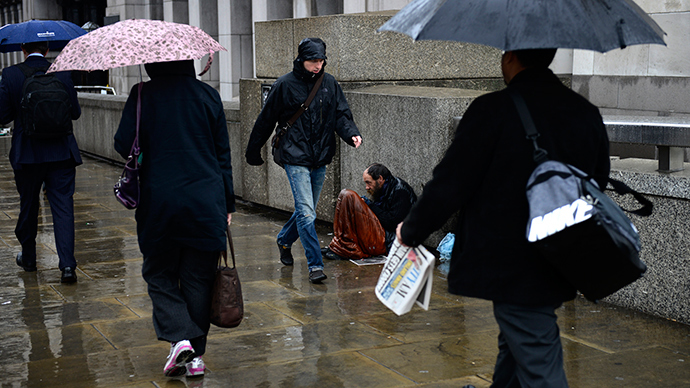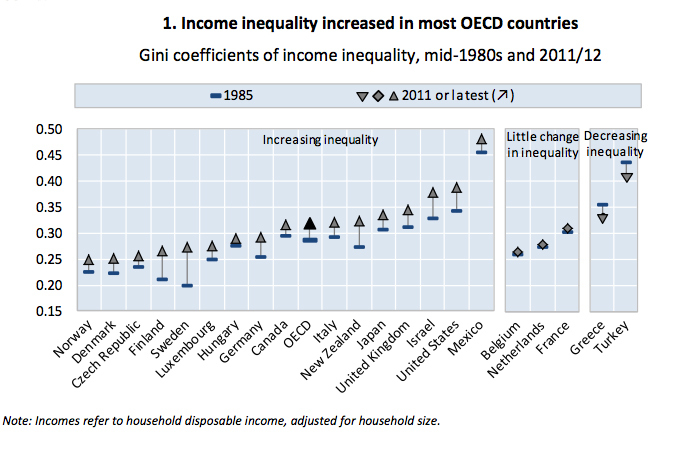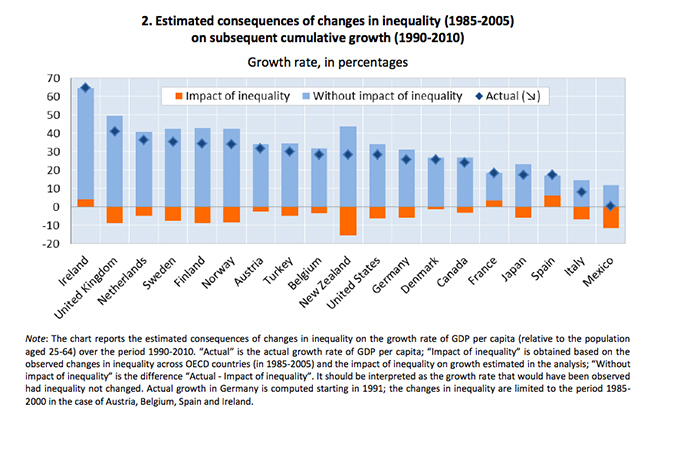More equal societies do better. Why then are governments supporting inequality?

The OECD has confirmed what most sensible economy watchers realized a long time ago - rising inequality is smothering economic growth globally. As the erosion of the middle class continues, when will policymakers wake up?
The gap between the rich and poor has reached its highest level for 30 years in most developed countries. Meanwhile, economic stagnation is general in Western nations and there has been no tangible recovery from the 2008 great financial crash. To question whether the two events are linked is to enter “Is the Pope a Catholic?” territory. The continuing consolidation of wealth in the hands of a global super-rich - which often evades practically all taxes – is stymieing human advancement.
Right now, the richest 10 percent of the population in the OECD (Organization for Economic Cooperation and Development) area earns 9.5 times more than the poorest 10 percent. Back in the 1980’s, the ratio was 7 to 1. Based in Paris, the OECD has 31, predominately Western, member states. The report argues: "The evidence is strongly in favor of one particular theory for how inequality affects growth: by hindering human capital accumulation income inequality undermines education opportunities for disadvantaged individuals, lowering social mobility and hampering skills development." In English that means, robbing the lower income brackets to line the pockets of the mega-rich is a disastrous approach.
In 1944, at Bretton Woods, the Western world adopted the economic policy of embedded liberalism, a combination of free trade and state regulation. The primary goal was to keep unemployment low and capital circulating. Thus, the middle class immediately grew and prospered. In the 1950s and ’60s the global economy experienced higher growth than any time before or since.

The UK renaissance
Socially, the effects were profound. Let’s use Britain as our example. With free education, a welfare state and universal healthcare, social mobility mushroomed. Twenty years after WW2, the first generation to benefit came of age and ushered in the ‘Swinging Sixties.’ British culture and business was no longer driven by the gentry or those with inherited wealth - everything was possible for anyone. No longer were Lord Stiff Upper-Lip and his cronies holding court at the best clubs, it was working class youth, exemplified by the likes of John Lennon and Paul McCartney.
Rising equality meant that the UK was maximizing the strength of its best asset - its people. The sense of opportunity heralded by the post-war reforms meant that human capital was allowed to fulfill its potential and the economy boomed.
Sometime around 1980, neoliberalism took hold, primarily driven by Margaret Thatcher and Ronald Reagan. The system doesn't work and is destroying Europe, while accelerating the decline of the West.
Nevertheless, it has copious cheerleaders in the media. The irony here is breathtaking. Most top journalists have a middle class income level. However, the continuing squeeze on traditional media means that many are now barely earning what could be considered working class salaries, and precarious ones at that. Despite this, these not particularly well remunerated hacks are cheerleading a system that works against their own interests. Neoliberalism is to the majority of professional classes what Christmas represents for Turkeys - a very bad thing.

Curious logic
In America there’s a branch of the Republican Party known as the Tea Party Movement. It advocates less government spending plus lower taxes and strongly opposes President Obama’s attempts to usher in a form of free health care. There’s another collective insanity here. Curiously, many of the movements’ supporters are low income workers who are voting against their own economic interests. My head hurts trying to figure out the logic of these stances.
Back to the OECD report. Over the 30 years surveyed, the US, Japan and UK witnessed the largest increases in inequality. Of course, Japan is stagnant and the other two are limping along economically in an attempt to get back to (in real terms) pre-2008 levels. Interestingly, equality is actually improving in Turkey where the economy has grown by 24 percent since 2010. By contrast the UK has posted 4.8 percent in this period. Are the two connected? Of course they are.
The OECD reckons that if the UK hadn’t adopted the worst excesses of Thatcherism, its total economy would now be 9 percent larger. What the number crunchers omit is the fact that it’s also likely that the vast majority of people would be significantly happier. The Paris ‘brains trust’ also confirms that an increase in income for the top one percent doesn’t benefit the overall climate. However, a drop in income for the lower middle and working classes is cataclysmic. This is quite easy to comprehend.
If you give Joe Bloggs in Sheffield, earning £400 a week, an extra £50, Joe is going to spend it. That money will circulate and lift many boats. Conversely, if you hand Bill Gates that £50, he most probably won’t notice.
Outside of the OECD, inequality is also stark. In African countries, the gap is mind boggling but it’s also profoundly wide in some industrial nations. For example, China, Russia and Brazil have serious room for improvement.
Russia is an interesting case. The Soviet period brought a huge initial burst of progress within a stifling system. Following the collapse of the USSR, Russia became one of the most unequal places on earth and the country endured huge trauma. Since the 1998 crash, equality has risen in Russia and a middle class has emerged. However, with the country searching for solutions to its current economic problems, it's clear that a renewed push to fairly distribute Russia's wealth could be winning strategy.
The salient truth here is that more equal societies do better - on almost every metric. They are less vulnerable to economic shocks, have fewer social problems and more content populaces. According to the OECD report, Finland, Denmark and Sweden top the charts. Now, when did you last hear of a Copenhagen version of the London riots? Or a Finnish version of Ferguson?
The statements, views and opinions expressed in this column are solely those of the author and do not necessarily represent those of RT.
The statements, views and opinions expressed in this column are solely those of the author and do not necessarily represent those of RT.













